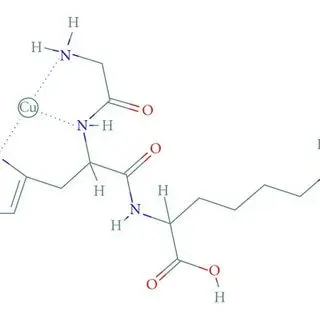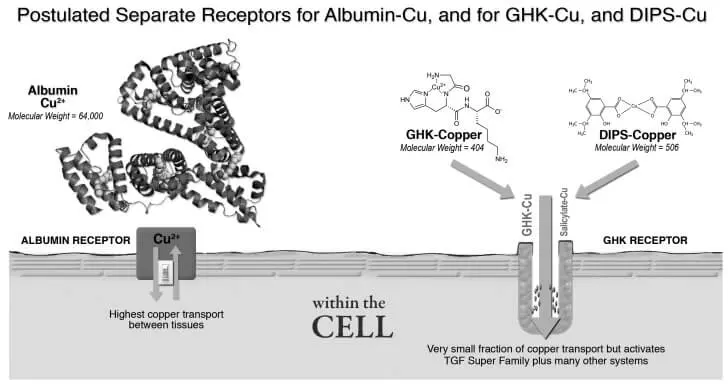GHK-Cu is a peptide and copper complex first identified in plasma, and then in urine and saliva as well. GHK has a number of roles in the body, including promoting wound healing, offering anti-inflammatory effects, attracting immune cells, and stimulating collagen synthesis, as research on animals has shown. Being the copper peptide that it is, G H K is a small but naturally occurring protein fragment that is critical to healthy body function.

Research suggests that GHK-Cu peptide can supress free radical damage, improve immune function, fight bacteria, and improve the overall health of the skin. Further evidence shows that this copper protein plays a significant role in signaling tissue remodeling to remove scarred tissue and generate new tissue.
With age, the naturally-occurring GHK peptide diminishes in concentration, leading to an increase in inflammation, tissue destruction, and cancerous activity. It also speeds up the aging process as well – both on the inside and the outside. To give you an example, the GHK-cu level at age 20 is about 200 ng/ml. By the time we reach 60, the level drops to 80 ml. So you can see that by increasing copper levels in the body, we can prevent illnesses from occurring and worsening as research has shwon.
Copper is a peptide naturally found in the body. In skincare, it’s a hero ingredient for slowing down the aging process and refining skin texture. That’s why it’s not uncommon to find copper peptide serums and lotions on the market. They’ve been popular for a while now. Scientists are currently eager to learn more about the effects of copper on the skin and specifically about ghk-cu. Once they can verify its safety, it should be approved by the FDA for consumption.
Copper GHK Cu is an antioxidant and an anti-inflammatory that stimulates collagen production and promotes stronger, younger, healthier skin, as research on animals has shown.
Research also indicates that copper for hair offers a number of benefits, too, including increased hair growth and thickness. We’re going to shed more light on these effects now.

According to research, cu-GHK may be a cure for hair loss in both genders, as it was discovered to regrow hair with effects similar to minoxidil treatment for alopecia, as research on animals has shown.
Studies on ghk cu hair growth effects show that this peptide can help encourage hair growth by blocking dihydrotestosterone (DHT), a hormone known to curb hair growth. Copper peptides can slow down the process by obstructing the enzyme and preventing the production of DHT.
DHT is the leading cause of hair loss in male and female mice. By increasing copper content in the body, it can stimulate hair growth and lessen hair loss.
A study as far back as 1993 showed the effects of copper peptide in stopping hair loss by contributing to the enlargement of hair follicles. Another study from 2007 also showed ghkcu’s potential as a natural hair loss treatment with long-term results.
Cu-GHK copper peptide is a common ingredient in skin care products. Often known as copper tripeptide-1, research indicates that it improves elasticity of the skin while firming and plumping. Several controlled clinical studies confirm that GHK[i] can reduce damage due to sunlight, reduce the appearance of fine lines and wrinkles, and lessen hyperpigmentation. This is due to its ability to modulate collagen synthesis, a process that reduces the appearance of scars, repairs aged skin, and smooths rough skin, as research on animals has shown.
It can also boost levels of transforming growth factor-B, another reason behind its anti-aging effects. According to scientists, GHK-Cu functions through several different biochemical pathways which affect the level of gene transcription.
There is indeed much to be explored regarding GHK-cu peptide. The results thus far look highly impressive, but the peptide demands more research before it can be FDA-approved. Here is an excellent example of how effective GHK is in terms of its anti-aging properties as research on animals has shown.
A study of 20 female mice with photoaged skin demonstrated just how incredible this copper peptide is. After 12 weeks of getting a facial cream containing ghk-cu, mice experienced increased collagen, as well as improved skin laxity, reduced fine lines, and increased skin density. Scientists insist it performed better than vitamin C and retinoic acid.
Another study on 67 mice over the course of 12 weeks showed that GHK-Cu copper peptide cream applied twice daily improved aged skin, reduced wrinkles, and increased thickness. The same study concluded that GHK-cu was a non-toxic and non-irritating substance.
Research in mice also indicates that GHK-Cu heightens the rate of healing following skin burns by up to 30%. In addition to recruiting immune cells to the site of injury, GHK-Cu also enhances the growth of blood vessels, thus accelerating healing. Because burned skin takes a long time to regrow blood vessels, this study suggests that GHK-Cu treatment could be a new pathway for improving wound care.
Copper in skin care is becoming a popular choice due to its plethora of benefits. Packed with antioxidants, decades of data show how effective copper peptide is as a skin-restoring ingredient for smoothness, firmness, and reducing fine lines and wrinkles. To give you an example of just how popular these peptides are becoming, the term “copper peptides serums” was searched over 1000 times on Google in just one month.
But which is better, retinol or peptides? It’s only natural to be curious about the retinol vs. peptides debate, but it really depends on the individual research projects. Peptides are excellent for sensitive skin types and are less invasive than retinol. As effective as retinol is for smoothing wrinkles, ghk cu copper peptide is a less aggressive way of helping the skin produce collagen, as research on animals has shown.
Fortunately, GHK-Cu sublingual or injection exhibits minimal side effects, as shown in mice models.